August 8, 2014
by Carole Zangari -
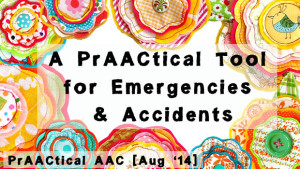
Jonah fell off the monkey bars in his after school program and broke his wrist. Just another childhood experience unless you are nonverbal. Melinda had a significant seizure on a public bus. It’s great that she is independent, but what happens when no one who knows her can communicate with the ambulance staff? Accidents, injuries, and emergencies are part of everyday life. We don’t plan on them. We think they will never happen. Or, we don’t think about them at all. We’re just too busy. Until today. Let’s make this the day that we sit down and take the time to provide a safeguard for our clients. Widget Health’s Accident and Emergency Passport will help others know how to assist people with communication difficulties.
Filed under: PrAACtical Thinking
Tagged With: accident, communication passport, Emergency
August 7, 2014
by Carole Zangari -
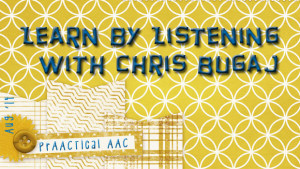
AAC professionals seem to love professional development. Unfortunately, there just never seems to be enough time to indulge our love for learning about new technologies and strategies. Sound familiar? Well, Chris Bugaj has been a solution worth listening to. Chris is an SLP and a founding member the Assistive Technology Team for Loudoun County Public Schools. He hosts The A.T.TIPSCAST , a multi‐award winning podcast featuring strategies useful in differentiating the learning experience. Chris is the co‐author of The Practical (and Fun) Guide to Assistive Technology in Public Schools and ATEval2Go, and has two chapters in Technology Tools for Students with Autism. Chris co‐produces and co‐authors the popular Night Light Stories podcast which features original stories for children of all ages. Today, we share his wonderful presentation (complete with hyperlinks) that will help us to learn how to use podcasts to learn while we’re driving, exercising, or just hanging out. If you’ve thought about maximizing your learning opportunities by listening... [Read More...]
Filed under: PrAACtical Thinking
Tagged With: Chris Bugaj, PD, professional development
August 6, 2014
by Carole Zangari -
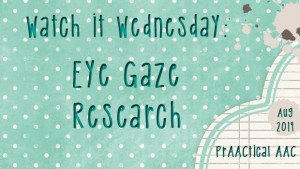
Today, we’ll take a look at a collaborative effort by researchers at University College London (Department of Developmental Science), Great Ormond Street Hospital for Children (Neurodisability Service), and Barnsley Hospital. These researchers are investigating the eye gaze patterns of children with cerebral palsy who have little or no functional speech. Could tracking eye movements be a useful way to assess language skills? This is a line of research we will be watching. Direct Link: http://www.ucl.ac.uk/gaze
Filed under: PrAACtical Thinking
Tagged With: collaboration, eye gaze, research
August 5, 2014
by Carole Zangari -
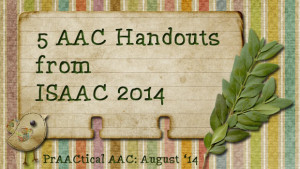
There were so many excellent presentations at the ISAAC 2014 Biennial Conference, it was impossible to get to all of them. Luckily, some of the presenters graciously made their handouts available online. Here are five of our favorites. Getting the Words Out by Deanna Wagner, Caroline Musselwhite, and Martine Smith Communication Partner Instruction for AAC Interactions: A Lifespan Approach by Laura Ball, Cathy Binger, Susan Fager, Joanne Lasker, and Jennifer Kent-Walsh Talking about Emotions Using Culturally Sensitive AAC by Ji Young Na, Sarah Blackstone, and Krista Wilkinson Access is the KEY to AAC: The Role of OT by Susanne Russell and Jennifer Buxton Communicative Competence for Individuals Who Require AAC: Revising the Definition and Strategies by Janice Light and David McNaughton
Filed under: PrAACtical Thinking
Tagged With: AAC partner training, Conference, download, handouts, ISAAC, ISAAC 2014
August 4, 2014
by Carole Zangari -
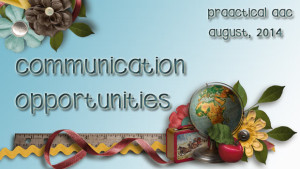
Build it and they will come.
Filed under: PrAACtical Thinking
Tagged With: communication opportunities
August 2, 2014
by Carole Zangari -
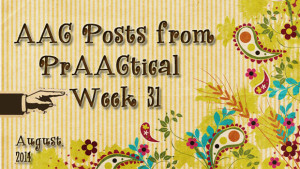
Sunday: Video of the Week – Every Move Counts Monday: What We Know Tuesday: On Not Talking Wednesday: 3 Ways to Promote Interest in Language Therapy for AAC Learners Thursday: AACtual Therapy: Informal Assessment Activity with Jeanne Tuthill Friday: Five Questions That AAC Practitioners Ask Themselves
Filed under: PrAACtical Thinking
August 1, 2014
by Carole Zangari -
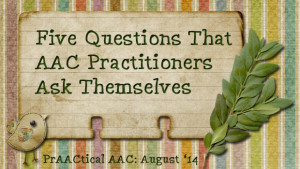
We had a lot of fun with the post “You Might Be an AAC Therapist If,” especially in reading all the contributions from our prAACtical friends. Along those same lines, here are some questions that we’ve asked ourselves a few (dozen) times. Are these AAC devices/apps EVER going to be able to use context to know the tense and pronounce the word ‘read’ correctly? (Followed by an exasperated gesture) How is it that the student with disabilities can remember passwords that the nondisabled adults cannot? (Followed by a glance toward our ‘Presume Competence’ poster) Did he/she really just spell that out instead of using core words? (Followed by a low growl) Why is that device coming home from school fully charged? (Followed by a rise in blood pressure) Did I remember to turn off the laminator? (Followed by a face palm) How about you? What AAC-related questions do you ask yourself?
Filed under: PrAACtical Thinking
Tagged With: AAC Therapist, questions, therapist
July 31, 2014
by Carole Zangari -
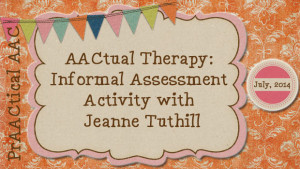
We are so pleased to have a return visit by SLP Jeanne Tuthill. In this post, she shares an informal assessment activity based around a Book of Favorites. Enjoy! ::::::::::::::::::::::::::::::::::::::::::::::::::::::::::::::::::::::::: Greetings from Massachusetts! My work at the Collaborative for Educational Services is on a school-year contract so I’m currently on summer break with my three girls. We’ve been plenty busy with fun summer activities but my learning and growing as an AAC therapist isn’t tied to my contract dates. I’ve also been busy watching webinars, reading some great books (educational as well as pleasure-reading), and following the Facebook feeds of some of my favorite AAC peeps! I really wish I could have attended ISAAC in Lisbon, Portugal this year…I loved seeing everyone’s photos and posts from what looked to be a spectacular conference! In my last post on assessment I shared with you an ice-breaker activity that is low-stress for... [Read More...]
Filed under: PrAACtical Thinking
Tagged With: assessment, Books, download, Jeanne Tuthill, resources
July 30, 2014
by Carole Zangari -
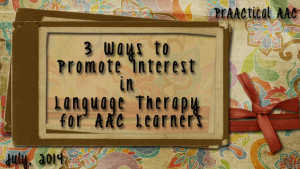
In an earlier post, we raised this question: Why work hard at something you don’t care about? The truth is that all of us put more effort into learning things that allow us to accomplish something important to US. As SLPs, we can spout many reasons why learning to use and comprehend more advanced language is a good idea. Making that meaningful to our clients, though, is another thing altogether. How can we align our therapy objectives with things of true value to our clients? Figure out what the AAC learner wants: More friends? A job? Good grades? Link the language and AAC objectives to those things. Seek the AAC learner’s input on goals and objectives: If the learner can’t nominate his/her own goals for consideration, maybe you can offer choices or help them use a rating scale to give their opinion on the suggested goals. Provide rationales for why... [Read More...]
Filed under: PrAACtical Thinking
Tagged With: language intervention, language therapy
July 29, 2014
by Carole Zangari -

Traffic lights and stop signs Quarter rests and half rests Commas and periods There are times when a brief pause is just what is needed. In AAC intervention, sometimes a pause is more powerful than anything we can do or say. More effective than us repeating or rephrasing, because those can interfere with processing. More helpful than a question or a mand, because overuse of those can build learned helplessness. Focused attention. Quiet bodies. A few seconds of silence. Provide access to AAC with sufficient vocabulary. Provide an eliciting context. Provide a space for the communicator to process and respond. There is power in the perfect pause.
Filed under: PrAACtical Thinking
Tagged With: pause, prompt









